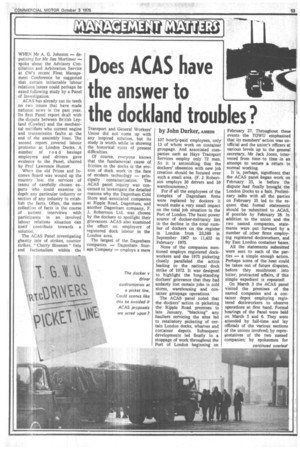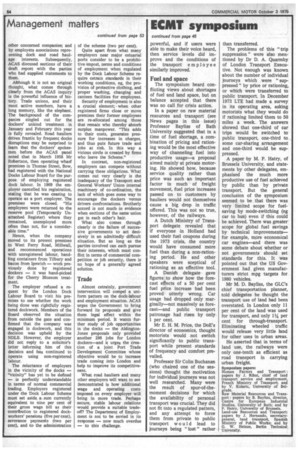Does ACAS have the answer to the dockland troubles?
Page 55

Page 56

If you've noticed an error in this article please click here to report it so we can fix it.
by John Darker, AMBIM WHEN Mr A. G. Johnson — deputising for Mr Jim Mortimer — spoke about the Advisory Conciliation and Arbitration Service at CM's recent Fleet Management Conference he suggested that certain intractable labour relations issues could perhaps be eased following study by a Panel of Investigation.
ACAS has already cut its teeth on two issues that have made national news in the past year. Its first Panel report dealt with the dispute between British Leyland (Cowley) and the mechanical rectifiers who correct engine and transmission faults at the end of the assembly lines, The second report covered labour problems at London Docks. A number of r o a d haulage employers and drivers gave evidence to the Panel, chaired by Prof Lawrence Hunter.
When the old Prices and Incomes Board was wound up the country losz the services of teams of carefully chosen experts who could examine in depth any particular industry or section of any industry to establish the facts. Often, the mere collection of facts in the course of patient interviews with participants in an involved labour relations situation can itself contribute towards a solution.
The ACAS Panel investigating ghastly tale of strikes, counter strikes, "Cherry Blossom" lists and factionalism within the Transport and General Workers' Union did not come up with any inspired solution, but its study is worth while in showing the historical routs of present difficulties.
Of course, everyone knows that the fundamental cause of friction in the docks 'is the erosion of dock work in the face of modern technology — principally containerisation. The ACAS panel inquiry was concerned to investigate the detailed reasons why the Dagenham Cold Store and associated companies at Ripple Road, Dagenham, and another Dagenham company, F. J. Robertson Ltd, was chosen by the dockers to spotlight their grievances. ACAS also examined the effect on employers of registered dock labour in the London area.
The largest of the Dagenham companies — Dagenham Storage Company — employs a mere 107 hourly-paid employees, only 13 of whom work on container groupage. And associated companies such as Hays Transport Services employ only 72 men. So it 'is astonishing that the dockers' obsession with new job creation should be focused over such a small area. (F. J. Robentson employs 30 drivers and 10 warehousemen.) For if all the employees of the complex of Dagenham firms were replaced by dockers it would make a very small impact on the total job situation in the Port of London. The basic power source of docker-militancy lies in the decline in the total number of dockers on the register in London from 23,589 in September 1967 to 11,452 in February 1975.
None of the companies mentioned employs registered dockworkers and the 1975 picketing closely paralleled the action leading to the national dock strike of 1972. It was designed to highlight the long-standing deckers' grievance that they had unfairly lost certain jobs in cold stores, warehousing and container groupage operations.
The ACAS panel noted that the d'ockers' action in picketing the Ripple Road premises 'in late January, "blacking" any hauliers servicing the sites led to retaliatory picketing of certain London docks, wharves and container depots. Subsequent developments led finally to a stoppage of work throughout the Port of London . beginning on February 27. Throughout these events the TGWU emphasised that its members' action was unofficial and the union's officers at various levels up to the general secretary, Mr Jack Jones, intervened from time to time in an attempt to secure a return to normal working.
It is, perhaps, signfficent that the ACAS panel began work on February 25, ie before the dispute had finally brought the London Docks to a halt. Preliminary talks with all the parties on February 25 led to the request that formal statements should be submitted to ACAS, if possible by February 28. In addition to the union and the two named companies, statements were put forward by a number of other firms employing registered dockworkers, 'and by East London container bases.
All the statements submitted were sent to each of the parties — a simple enough action. Perhaps some of the heat could be taken out of future disputes, before they mushroom into hitter, protracted affairs, if this simple expedient is repeated/ On March 3 the ACAS panel visited the premises of the named companies and a container depot employing registered dockworkers to observe operations at first hand. Formal hearings of the Panel were held on March 5 'and 6. They were attended by fun-time and lay officials of the various sections of the unions involved; by representatives of the two named companies; by spokesmen for other concerned ourapanies; and by employers associations representing dock and road haulage interests. Subsequently, ACAS &soused seotions of their draft report With the parties who had supplied statements to them.
Although it is not an original thought, what comes through clearly from the ACAS inquiry is the powerful influence of history. Trade unions, and their most active members, have a long memory, like the elephant The background of the companies singled out for the dockers' unkind treatment in January and February this year is fully revealed. Road hauliers driven frantic by frequent docks disruptions may he surprised to learn that the dockers' spokesmen before the ACAS panel noted that in March 1958 Mr Robertson, then operating wharf premises in Thomas Street, Bow, had registered with the National Docks Labour Board for the purpose of employing registered dock labour. In 1969 the employer cancelled his registration, stating that he was ceasing to operate as a port employer. The premises were closed. "His employees were returned to the reserve pool (Temporarily Unattached Register) where they remained, unemployed more often than not, for a considerable time."
Hence, when the company moved to its present premises in West Ferry Road, ,Millwall, and recommenced operations with unregistered labour, handling containers from Tilbury and bacon from Ipswich — work previously done by registered dockers — it was hand-picked for the Cherry Blossom treatment.
The employer refused a request by the London Dock Labour Board to visit his premises to see whether the work being done was rightfully registered clockwork. Members of the Board observed the situation from outside the gate and confirmed that the company was engaged in clockwork, and this decision was upheld by the NDLB. However, the employer did not reply to a solicitor's letter informing him of this decision and has continued to operate using non-registered labour.
The reluctance of employers in the vicinity of the docks • "vicinity" has yet to be defined — perfectly understandable in terms of normal commercial trading. Employers registered under the Dock Labour Scheme must set aside,gesum currently equivalent to nine per cent of their gross wage bill as their contribution to registered dock. workers' pensions (five percent), severance payments (two per cent), and to the administration of the scheme (two per cent).
Quite apart from what many employers near major estuarial ports consider to be a prohibitive impost, terms and conditions of employment when regulated by the Dock Labour Scheme require cetrain standards in their working conditions, eg, the provision of protective clothing, and proper washing, changing and canteen facilities for employees.
Security of employment is also a crucial element; \ when other registered firms close or move premises their former employees are re-allocated among those that remain who thereby absorb surplus manpower. "This adds to their costs, generates pressure for increases in charges, and thus puts future trade and jobs at risk. In this way a vicious circle is created by firms who leave the Scheme."
In contrast, non-registered employers can compete without carrying these obligations. What comes out very clearly is the inadequacy of the Transport and General Workers' Union internal machinery of co-ordination, the lack of which goes some way to encourage the dockers versus drivers confrontations. Brotherly . accord is not much in evidence when sections of the same union get in each other's hair.
What also comes through clearly is the failure of successive governments to act decisively in an admittedly difficult situation. But as long as the parties !involved can each pursue their interests, which must conflict in terms of commercial competition OT job security, there is no hope of a generally agreed solution.
Trade
Almost cetrainly, government intervention will compel a uniform pattern on the dock-labour and employment situation. ACAS urges the Government to bring forward its proposals and give them legal effect within the minimum period. It wants further study of job opportunities in the docks — the AldingtonJones proposals only provided another 286 jobs for London dockers—and it urges the creation of a joint Port Trade Development Committee whose objective would be to increase trade coming into London and help to improve its competitiveness.
What road hauliers and many other employers will want to see demonstrated is how additional wage and operating costs imposed on every employer -will bring in more trade. Perhaps secure, stable labour relations would provide a suitable tradeoff? The Department of Employment is not to be envied in its response — now much overdue — to this challenge.




































































































